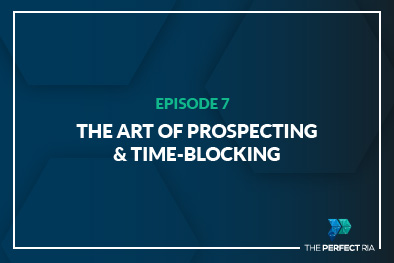Matthew Jarvis provides valuable business strategies for fellow advisor Adam Hersh.
We could all benefit from little tweaks in our routines from time to time. Even if our normal systems seem to be working just fine, we can often fall into comfortable patterns that are actually detrimental to the overall value of our practice. Instead of venturing out and approaching client prospecting in a more creative way, one can grow far too relaxed with the prospecting process. Instead, as Matthew Jarvis explains in this episode to his friend and colleague Adam Hersh, one needs to go out and approach getting new clients as an urgent endeavor. To paraphrase Matt in the first portion of the talk, so often fledgling or relatively new business owners become so busy with their work that they totally forget to continue to go out and find new clients; it is put on the backburner, becomes an avoidance activity, and as a result, the net value and sustainability of their practice suffers.
When asked for some tips on how to generate new clientele, Matthew relays to Adam some of the things he has learned while he was enrolled in Tom Gau’s and Ken Unger’s program the Academy of Preferred Advisors, as well as lessons he has learned throughout his career. Starting with Tom Gau, who was actually profiled in Malcolm Gladwell’s book The Tipping Point, Matt tells Adam and those listening along that being connected to Tom Gau and modeling his habits helped structure his own methodology for how he went about business. It also helped him shake self-doubts–limiting beliefs– that he wasn’t qualified to represent retirees because of how young he was. Instead, Matthew makes a great point by saying that you can use your age to your advantage: if you are a long way from retirement, why not highlight that fact to your clients. You can assure your clients that you will not be retiring before them, so there is no need to have to get a new advisor a few years in the future. Never underestimate that type of locked-in assurance for those you advise.
In addition, Matt offers up some more strategies for attracting new clients. One of these is teaching a class at the local community college for free. The end goal of course being that potential new clients will end staying for the entire information-overloaded three hour lecture, and will ask questions afterwards when you talk with whoever wants to talk. The lecturing is also very good public speaking practice which is an invaluable tool for financial advisors. Also, he touches briefly on his own firm’s prospecting process, and to get an idea of what it is, you can visit his website, scroll down and learn the steps that are initiated before someone becomes a client of Matt’s.
This is where time management becomes such an important thing.Instead of allowing oneself to slip on prospecting, Matt introduces a term he calls “forcing mechanisms” as a way to approach the problem of not prospecting enough. By segmenting time or organizing blocks of time for very specific purposes–like a specific day only for prospecting (let’s say Friday)–you then force yourself to approach a problem for more than an hour at a time. It’s pretty easy to fall into patterns of working on every little thing at once, with very unproductive results. Instead, Matt teaches us that if you utilize forcing mechanisms and block out your time, you will get into enough of a groove to establish positive prospecting habits and time management skills. But if you continue to find yourself running out of time or running around like a headless chicken, Matt suggests that you probably need to hire a virtual assistant.
During the talk, Matt reminds listeners that he has talked about this very subject in a previous episode of the podcast where he had Gina Cotner, the CEO and Owner of Athena Executive Services on the show. And the reason he advises guest Adam Hersh to hire a virtual assistant is because Adam has found himself in charge of almost everything in his practice. Matt stresses this because of how important delegation is for saving time on the lower-value tasks that can quickly become unruly during a daily routine. He suggests hiring a virtual assistant for ten hours a week. In that case, paperwork would then become a matter of writing out the process for the assistant, and looking it all over briefly before signing on the dotted line. And Athena Executive Services would be the platform to rely on in this case. Matt also suggests checking out The 4-Hour Workweek by Tim Ferriss for more ideas on just how important delegation and virtual assistants are.
After giving Adam some good advice on prospecting, he shifts gears to let him know that his clients have to be valuable enough to take his time. That is, you cannot expect to sustain your practice if you are spending your time on those who can’t financially support you. There has to be a balance between the amount of work you put in, the money you need to grow as a business, and the revenue that is generated. There needs to be a viable push-pull between the services rendered to the client and the profitability of the relationship. To paraphrase Matt, one wouldn’t charge a client $2 an hour just because they are a nice person. There needs to be a realistic and strict fee charged, across the board, and one that helps maintain your firm. Otherwise you are wasting your time.
To wrap up the episode and the valuable talk that Matt has with Adam, he offers five steps for all of those listening at home. Think of it as the cherry on top for the entire talk. These are: (1) Designate a day of the week which is proactively spent on just working on one aspect of your business: office work or some other task. (2) Pick five non-value tasks to delegate or eliminate. (3) Read or reread Malcolm Gladwell’s book The Tipping Point. (4) Read or reread Tim Ferriss’s book The 4-Hour Workweek. And lastly, (5) Remind yourself that doing is the key to all success, and just knowing is not enough.
And as always, reading is one thing, but listening is an entirely different experience. Head down to the Perfect RIA website and subscribe or listen to this and any of the already published episodes. If you want to read along while you listen, below is the transcript for your convenience.








